|
|
|
Sort Order |
|
|
|
Items / Page
|
|
|
|
|
|
|
| Srl | Item |
| 1 |
ID:
160359
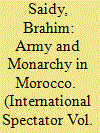

|
|
|
|
|
| Summary/Abstract |
The study of the complex relationship between army and monarchy in Morocco provides support for the argument that coup-proofing and institutionalisation enable civil leadership to enhance and maintain civilian control over the military. Through a strategy of coup-proofing implemented by the monarchy to protect itself from coups d’état, the army had been depoliticised. Through institutionalisation the Moroccan army is now governed by a clear set of constitutional and legal norms, principles and procedures with a system based on meritocracy. This approach is helping to stabilise relations between state and society and avoid power struggles between civilian leaders and the armed forces.
|
|
|
|
|
|
|
|
|
|
|
|
|
|
|
|
| 2 |
ID:
184222
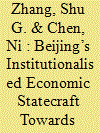

|
|
|
|
|
| Summary/Abstract |
This study adopts an institutional approach in the case analysis of China's economic statecraft towards Brazil. In light of institutionalisation theory, it examines the institutional arrangements between Beijing and Brasilia for the purpose of facilitating bilateral economic cooperation and advancing strategic partnership. As a descriptive effort, it yields some preliminary findings: first, the institutionalisation of China's economic statecraft towards Brazil is incremental, driven largely by the desire for and belief in long-term planning; second, a set of norms, values, and principles is instituted alongside designated agencies, point persons, operational protocols, and exchange mechanisms, creating a form of institutional governance based on a multi-actor, multilevel, and network-based steering mode; third, governance remains so centralised that it falls short in empowering strategic participation; and, fourth and finally, Beijing's institution-building proves useful in the management of relations with Brazil, suggesting that economic statecraft may benefit from institutionalisation.
|
|
|
|
|
|
|
|
|
|
|
|
|
|
|
|
| 3 |
ID:
177896
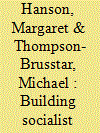

|
|
|
|
|
| Summary/Abstract |
Why do some attempts to use legal institutions to exert central state control fail, while others succeed? Through a controlled comparison of the Soviet Union (USSR) and the People’s Republic of China (PRC), we analyse the institutionalisation of the procuracy, an agency charged with enforcing central legal directives. We show that institutional design, competition, and political support during critical junctures created a positive feedback for the institutionalisation of the procuracy in the USSR but left it weak in China. These findings contribute to our understanding of institutional development, state-building, and authoritarian legal control.
|
|
|
|
|
|
|
|
|
|
|
|
|
|
|
|
| 4 |
ID:
181905
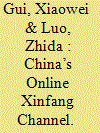

|
|
|
|
|
| Summary/Abstract |
Xinfang, as a major participation channel in China, sets social stability as its most important objective. The way it seeks to balance the participation-institutionalisation dynamic is thus key to understanding its function. Drawing on detailed interviews and archival sources, this study clarifies the practice and rationale of the new and important online xinfang channel which has not, to date, been amply examined. By integrating offline communication methods with the new online format, it achieves a subtler form of participation through field diversion, standardised settlement, and balanced evaluation, and thus partly corrects the offline xinfang channel’s heavy reliance on non-institutionalised tactics to maintain stability. However, as long as xinfang still operates at the intersection of law and politics, the question of how to balance citizens’ desire for participation and an appropriate level of institutionalisation remains a noteworthy issue, since stability is only achieved when these two elements are in equilibrium.
|
|
|
|
|
|
|
|
|
|
|
|
|
|
|
|
| 5 |
ID:
124665
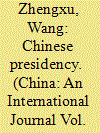

|
|
|
|
|
| Publication |
2013.
|
| Summary/Abstract |
The role of the Chinese presidency includes several important powers such as serving as the paramount leader of the Party, controlling the military, foreign affairs and national security portfolios of state power. With these configurations, a Chinese presidency has taken a preliminary shape - today China can be characterised as a one-Party presidential system. But ambiguities loom extraordinarily large, as the defining lines between Party powers and state powers are still undrawn and the constitutional bases of the presidency are almost entirely missing. Future developments, however, may offer breakthroughs in these areas.
|
|
|
|
|
|
|
|
|
|
|
|
|
|
|
|
| 6 |
ID:
112159
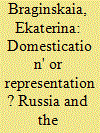

|
|
|
|
|
| Publication |
2012.
|
| Summary/Abstract |
Muslim integration in Russia is traditionally treated as a distinct field of research due to the diverse nature of Muslim communities and particular state approaches to ethnic and religious tolerance. The essay discusses Russia's historic engagement with Islam and suggests that some of its contemporary developments should be examined through a comparison of similar and different attempts to institutionalise Islam in Britain and France. The value of such a comparison lies in better understanding similar challenges to promoting moderate forms of Islam and engaging with Muslim representative institutions within different national contexts. Although the three countries developed different policies for integrating Muslim citizens, there is a degree of convergence in state determination to impose tighter security measures while using more integrationist rhetoric. Russia's engagement with Muslim communities provides an interesting hybrid which is partly reminiscent of Britain's multicultural aspirations and partly of France's drive for regulatory efficiency.
|
|
|
|
|
|
|
|
|
|
|
|
|
|
|
|
| 7 |
ID:
120677
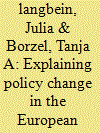

|
|
|
|
|
| Publication |
2013.
|
| Summary/Abstract |
This Introduction discusses the conventional wisdoms dominating the scholarship on policy change in the EU's Eastern neighbourhood countries and summarises the major findings of this collection. Drawing upon the empirical evidence underpinning the contributions to our collection, we argue that compliance with or convergence to EU policies happens despite high costs, limited capacities and the lack of EU membership prospects. We also challenge country-level or policy-type explanations that emphasise membership aspirations, asymmetric interdependencies between the EU and the neighbourhood countries, or the level of politicisation or institutionalisation characterising particular policy fields. Finally, our findings point towards important differences between membership, accession and neighbourhood Europeanisation by stressing factors mediating the EU's impact on policy change in the Eastern neighbourhood countries that played a rather marginal role in domestic policy change in EU member states and accession countries.
|
|
|
|
|
|
|
|
|
|
|
|
|
|
|
|
| 8 |
ID:
123113
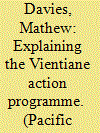

|
|
|
|
|
| Publication |
2013.
|
| Summary/Abstract |
Existing explanations for the emergence of human rights on the political agenda in ASEAN focus either on the role of external pressure on ASEAN member states to 'do something', or on the way those states copied the form, but not the function, of other regional organisations such as the EU. Both approaches tacitly acknowledge that given the strong preference for intergovernmental governance displayed by ASEAN, regardless of interpretations, that it was states that drove the institutionalisation of rights forwards. Through examining in detail the causes and consequences of the Vientiane Action Programme this article disagrees with that assertion. At crucial moments before and after 2004 it was the Working Group for the Establishment of an ASEAN Human Rights Mechanism, a track III actor, which both inserted human rights into ASEAN discussions and forged the link between protecting those rights and the continuing success of ASEAN's security goals. Through understanding the role of the Working Group as a norm entrepreneur, assisting in the localisation of human rights standards, this article suggests that existing explanations of ASEAN institutionalisation need to be revised to include a wider range of political dynamics than previously were acknowledged.
|
|
|
|
|
|
|
|
|
|
|
|
|
|
|
|
| 9 |
ID:
193034
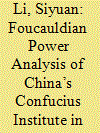

|
|
|
|
|
| Summary/Abstract |
The Confucius Institute (CI) was established in 2004 by China to disseminate its language, culture and other forms of positive knowledge to people of different nationalities. By critiquing existing analytical frameworks of the CI, this article draws on Foucault’s conception of power, which explains the role of language, culture, value and other non-material elements in the operation of power, to examine the case study of the CI in Africa. By investigating the CI’s power structure, its internal power operations and its power effects, this research seeks to ascertain the role of the CI in the institutionalisation of China’s foreign policy towards Africa.
|
|
|
|
|
|
|
|
|
|
|
|
|
|
|
|
| 10 |
ID:
177037
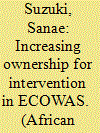

|
|
|
|
|
| Summary/Abstract |
After the Cold War, not only the United Nations (UN) but also regional organisations began to engage in the internal conflicts of their member states. The Economic Community of West African States (ECOWAS) has long intervened in West African conflicts, and institutionalised its approach to interventions in 1999. Since then, member states have maintained and even increased their commitment to managing conflicts in West Africa regionally – a willingness that implies their ownership of interventions. This article argues that ECOWAS member states share ownership because they have developed a common understanding about intervention. The development of this common understanding is analysed with a focus on the origin and evolution of ECOWAS, that is, on the multi-level process of generating consensus and on the principle and practice of sharing the costs of resource mobilisation. I will show that, in practice, these processes led each state to perceive an enhanced sense of ownership in ECOWAS interventions. Case studies of ECOWAS interventions in Liberia, Sierra Leone, Guinea-Bissau and Cote d’Ivoire in the 1990s and the 2000s, the period when the organisation’s interventions became institutionalised, support the argument.
|
|
|
|
|
|
|
|
|
|
|
|
|
|
|
|
| 11 |
ID:
097916
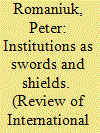

|
|
|
|
|
| Publication |
2010.
|
| Summary/Abstract |
International institutions are prominent in the 'global War on Terror'. But there remains variation in the institutionalisation of counter-terrorism, across policy domains and over time. I argue that institutions pursue tasks of counter-terrorism when they are backed by power. Institutions function as 'swords' as strong states seek to influence others. Weak states, too, are sensitive to the distributional consequences of cooperation and use institutions as 'shields' to resist the powerful. These claims are reflected in patterns of cooperation within the UN, and in terrorist financing and maritime security. Looking forward, multilateral counter-terrorism may remain contingent upon state power.
|
|
|
|
|
|
|
|
|
|
|
|
|
|
|
|
| 12 |
ID:
123011
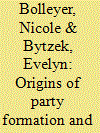

|
|
|
|
|
| Publication |
2013.
|
| Summary/Abstract |
Which new parties entered national parliaments in advanced democracies over the last four decades and how did they perform after their national breakthrough? This article argues that distinguishing two types of party formation (that facilitate or complicate party institutionalisation) helps to explain why some entries flourish, while others vanish quickly from the national stage. New parties formed by individual entrepreneurs that cannot rely on ties to already organised groups are less likely to get reelected to parliament after breakthrough than rooted newcomers. This hypothesis is tested on a newly compiled dataset of new parties that entered parliaments in 17 advanced democracies from 1968 onwards. Applying multilevel analyses, the factors that shape newcomers' capacity to reenter parliament after breakthrough are assessed. Five factors have significant effects, yet affect party performance only in particular phases: both a party's electoral support at breakthrough and its operation in a system with a strong regional tier increase the likelihood of initial reelection. In contrast, a distinct programmatic profile, the permissiveness of the electoral system and easy access to free broadcasting increase a party's chance of repeated reelection. Only formation type significantly affects both phases and does so most strongly, substantiating the theoretical approach used in this article.
|
|
|
|
|
|
|
|
|
|
|
|
|
|
|
|
| 13 |
ID:
157018
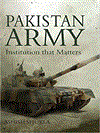

|
|
|
|
|
| Publication |
New Delhi, KW Publishers Pvt Ltd, 2017.
|
| Description |
xix, 357p.hbk
|
| Standard Number |
9789386288837
|
|
|
|
|
|
|
|
|
|
|
|
Copies: C:1/I:0,R:0,Q:0
Circulation
| Accession# | Call# | Current Location | Status | Policy | Location |
| 059267 | 355.0095491/SHU 059267 | Main | On Shelf | General | |
|
|
|
|
| 14 |
ID:
106096
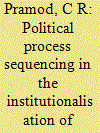

|
|
|
| 15 |
ID:
106945
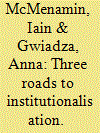

|
|
|
|
|
| Publication |
2011.
|
| Summary/Abstract |
Party institutionalisation is a central problem in political science. The literature tends to understand it as a syndrome and therefore has difficulty explaining variations. This article suggests a new approach based on the transaction between a legislative party and its deputies, the failure of which is observable in party switching. Three routes to institutionalisation are identified by appealing to the vote-seeking, office-seeking or policy-seeking motivations of deputies. Poland has had a large volume of party switching, along with wide variation in the incentives facing differently-motivated deputies. Survival analyses of switching in four Polish parliaments find that vote-seeking is the most likely route to institutionalisation for Polish parties. Moreover, in this article a concrete hypothesis is established for comparative testing: legislative parties can survive as long as their popular support exceeds 40 per cent of their share in the previous election.
|
|
|
|
|
|
|
|
|
|
|
|
|
|
|
|
| 16 |
ID:
095567
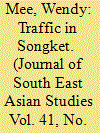

|
|
|
|
|
| Publication |
2010.
|
| Summary/Abstract |
This paper uses the example of songket to explore translocal Malay cultural processes in Sambas, West Kalimantan. I argue these intra-Malay cultural exchanges reframe selected Sambas Malay cultural forms as Malay 'cultural heritage', making it difficult to view cultural practices in purely localised terms. Consequently, many cultural forms lose their localised normative values and become aspects of a wider cultural heritage to be preserved, performed and consumed. The paper begins with a discussion of the historical, political and social grounds that forge a sense of translocalism amongst many Sambas Malays. Building on this, the more specific interest in participating in intra-regional Malay cultural exchanges is explained with reference to commodification, internationalisation and institutionalisation.
|
|
|
|
|
|
|
|
|
|
|
|
|
|
|
|
|
|
|
|
|